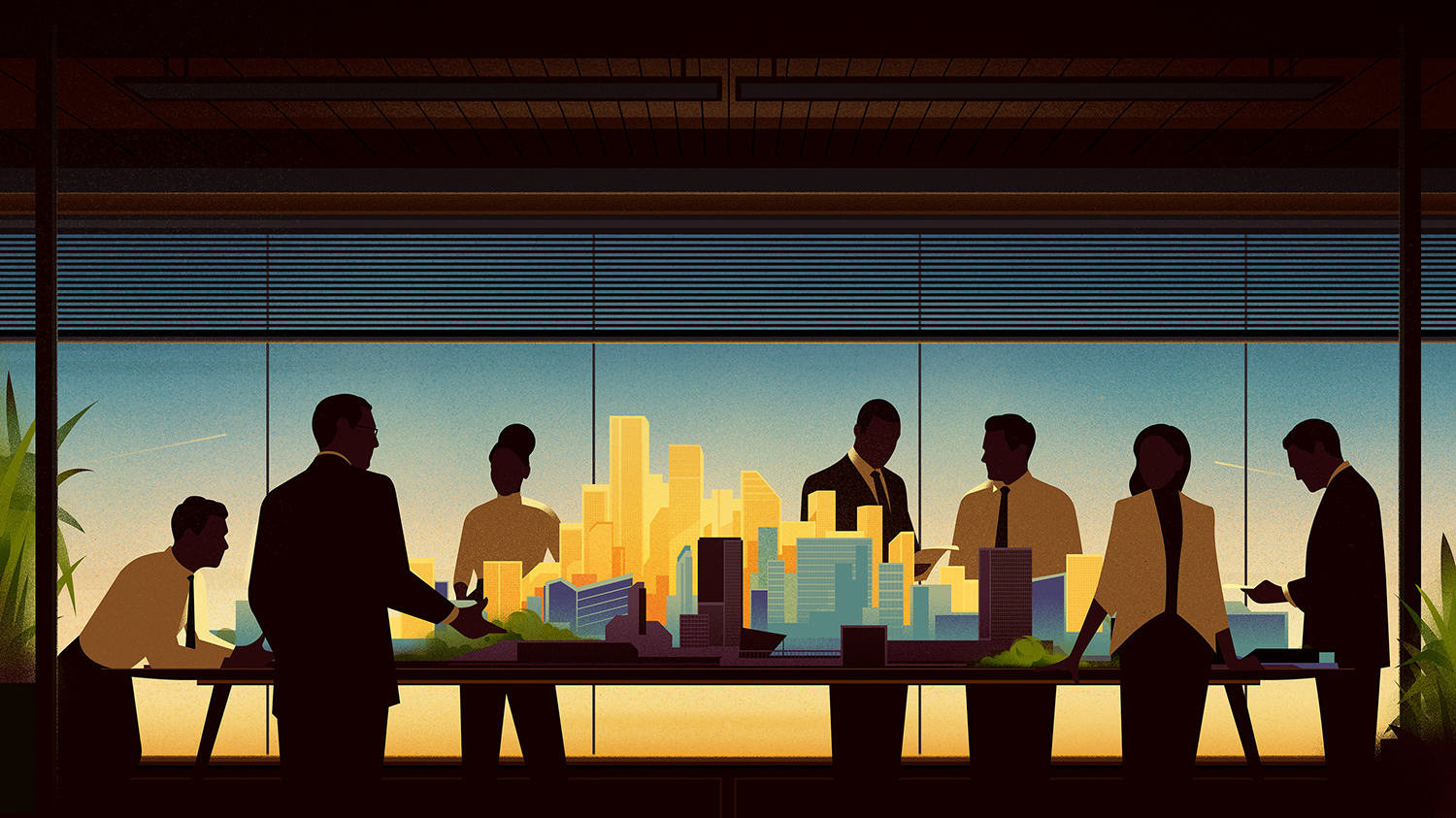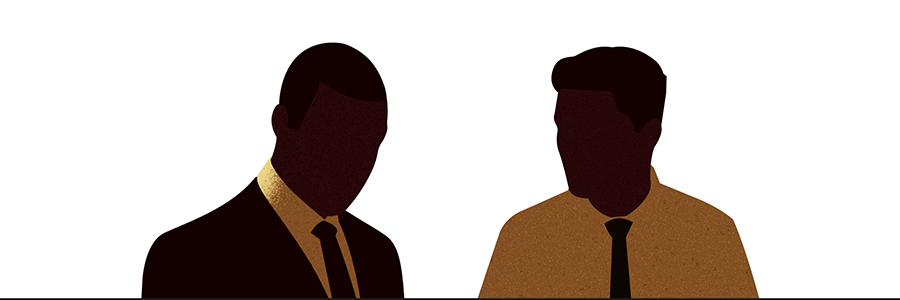
Illustration: Tom Peake
“Collaborating with and assuring our clients is a key priority. So too is providing relevant insights amid the alarming decline in transactions”
Marcel de Boer MRICS, director, Troostwijk Real Estate, Netherlands
COVID-19 has created a paradigm shift that is realigning every system in every industry across the globe. It has become extremely challenging to carry out real-estate valuations and meet the immediate need to provide accurate, fair assessments in today’s unusual and fast-changing environment.
Access to timely marketplace insights and informed guidance are vital for our businesses struggling to navigate uncertainty and ensure continuity. Collaborating with and assuring our clients is a key priority. So too is providing relevant insights amid the alarming decline in transactions and the effect this has had on values.
Our clients challenge us and want to understand how valuers are dealing with the current conditions of increased uncertainty around estimation and around outlook. RICS has helped us in issuing a statement advising the addition of an ‘uncertainty clause’ to valuation reports.
The pandemic is far from over. I can only speculate about the long-term consequences, but it will change our business models. To overcome the changes to framework conditions and the wide spectrum of possible outcomes, innovation and leadership is key.
"Such a fluid environment demands a more dynamic approach to understanding not just ourselves, but also the larger ecosystem"
George Hongchoy FRICS, Link REIT, Hong Kong
Link continues to adapt with the rapidly changing pace of retail during these turbulent times, while recognising that, more so than ever before, we must move towards a more collaborative approach to business. Our pandemic response is part of the “business as mutual” model articulated earlier in the year.
As an integral part of the community, our job is to find mutual value for the various stakeholders, with more strategic engagement to advance our corporate vision. Mutual value has become the focus of how we plan and conduct ourselves as an organisation.
COVID-19 and the social incidents in Hong Kong, coupled with overall economic uncertainty, have brought disruptions that are changing the way societies function. To emerge from the crisis in a better, more resilient position, we have to re-examine our strategies and relationships and move towards business as mutual mentality.
While we remain agile and responsive, such a fluid environment demands a more dynamic approach to understanding not just ourselves, but also the larger ecosystem that includes our stakeholders.
Truly sustainable businesses are the ones that can navigate through such uncertainties, focus on what is material and of significant consequence and adjust their business models appropriately.

“My biggest lesson from COVID-19 has been to always check the pulse of changing customer behaviour and stay relevant as a brand”
Amit Ramani MRICS, founder and CEO, Awfis, India
With de-densified workspaces and a distributed workforce environment becoming the new normal, we launched a work-from-home solution, which provides the flexibility to work efficiently from home while replicating the setting of a productive office, including the physical infrastructure, IT and tech integration. We are already witnessing great traction for this product.
We also introduced a new service that enables organisations to re-purpose their under-utilised real estate as flexible working space, providing them with an additional revenue source. We partner with them to set up the flex space within their premises and enter into a revenue-sharing model while expanding our footprint. We are expecting a significant uptake for this offering, too.
My biggest lesson from COVID-19 has been to always check the pulse of changing customer behaviour and to stay relevant as a brand, by continuously reinventing and coming up with solutions for their exact needs.
“Where residents faced hardship, rather than adopt a blanket policy, we’ve treated them as individuals”
Helen Gordon MRICS, CEO, Grainger, UK
My priority was for Grainger to emerge even stronger and to continue as many of our activities as possible. We implemented a proactive strategy for lockdown focused on three areas: innovate, communicate and improve.
Through innovation, we found new ways of working that enabled us to operate our business remotely, including virtual viewings, so that we could let and sell property during lockdown – I even handed over my British Property Federation presidency via Zoom!
In times of uncertainty, communication is key, so we increased engagement with our residents, employees and suppliers. Where residents faced hardship, rather than adopt a blanket policy, we’ve treated them as individuals.
Throughout we’ve tried to maintain positive internal momentum, undertaking additional training and development in areas such as customer service and health and safety.
We also forward-planned as much as possible. Our preparation for returning to the office began in April and included extensive consultation with our employees. We had no intention of returning then, but the planning ensured our offices were fully ready and safe when the time was right.
While undoubtedly a very challenging time, there are so many learnings from this time and many positive initiatives that will genuinely influence and shape the way we do things. Most importantly, this time has demonstrated the value of the relationships we’ve been building with our residents for years, enabling us to be there and to support them.

“Moving forward, we are likely to take business continuity planning more seriously”
Dr Wilson Lim FRICS, CEO, Asian Assets Allianz, Singapore
As COVID-19 outbreaks are still being reported around the world, we, a professional services firm in Singapore, have been caught in the crisis. In accordance with our government’s social distancing requirements and with no face-to-face group meetings permitted, we, like people around the world, are adjusting to working remotely and interacting via video chat and other digital platforms.
Nevertheless, from experience, collaborating via video can be effective, especially when serving clients overseas in different time zones. While getting everyone together in person virtually is of great joy, if such groups are too big, it can also be a logistical nightmare.
Collaborating through virtual means is a new way of working. Virtual workspaces that can provide updates in real time are better positioned than those simply crafting emails that could be outdated by the time some employees and clients read them.
Moving forward, we are likely to take business continuity planning more seriously. It is about digitising our workflows, which allows us to have a much easier time maintaining operations throughout the chaos.
“Collaborations between competing companies and industry bodies became a new way of getting answers to so many questions”
Sanett Uys MRICS, managing director, Serendipityremix, South Africa
The COVID-19 pandemic came as a shock and we were not prepared. We had trips planned, family to see and sporting events to attend. Then everything came to a screeching halt. Everyone and everything went quiet as existing clients didn’t communicate new projects, new proposals weren’t requested and tenders were not appointed: dead silence.
Instructions were to finish what we can and to invoice and the cash flow cycle was disrupted. Everything took longer to accomplish and online meetings became the norm. As a small boutique consulting and research company, we shifted our focus and we regrouped, refocused, and re-engineered our service offering to be COVID-19 robust. With that, the learning curve started.
Staff morale and wellbeing was a key priority, because, without the team, we cannot operate. Cash-flow management became a very specialised skill as reserves had to be used creatively. Overnight, the structure of our industry changed, as some players fell away and new players stepped in to take their place. Collaborations between competing companies and industry bodies became a new way of helping the industry to get answers to so many questions. Over the past two months, the industry has settled into a new way of doing things, the rollout of new projects has commenced, and we see an increase in enquiries and tender opportunities.
From the chaos, we have learnt that we cannot go back to our old ways. Personalisation is critical and, out of the sadness and loss, rise new opportunities to build something better. This is a time for innovation and restructuring.
“People look to leaders for guidance on what to do, what to expect and how to act. They need support”
Paul Walters FRICS, director, Turner & Townsend, Canada
“Stay Safe – Stay Connected – Stay Productive” has been our message. As a director within a project management department, supporting and mentoring the team to help them realise their ambitions and develop into the next generation of leaders is a priority. While working remotely has been successful and teams are engaged and productive, it is apparent that the sense of isolation can be detrimental to the confidence and mental wellbeing of some.
People look to leaders for guidance on what to do, what to expect and how to act. They need support. I am pleased to say my experience since March is one of enhanced engagement, communication and openness with our teams, ensuring the correct level of support is being provided. This, in turn, has maximised trust and built confidence, while minimising stress and anxiety.
Widespread remote working for part of the week will now inevitably persist, but in an industry where human interaction and relationships are vital, working in isolation 100% of the time is not sustainable. The next generation of leaders need support and guidance, therefore this “new normal” must ensure a healthy balance.
